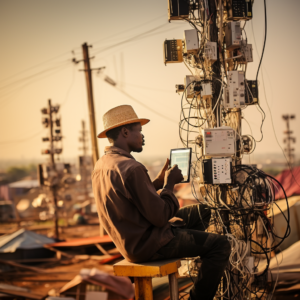
Africa towards a single digital market
Communication has always been a vector of development
It is the movement of people, goods and services from one point to another. With globalisation, electronic communication has become a tool for global and regional cohesion.
Despite the technological advances of this century, barriers have not disappeared:
- the lack of access to modern communication tools for the poor
- differences in the cost of access to this technology from one region to another
- national regulations in which each state tries to protect itself
- the tendency of some telecommunications companies to limit themselves to the territory in which they operate
- the lack of cooperation between companies and governments

Technological and digital barriers still need to be broken down if we are to ensure universal access to digital communications.
Zambia, Zimbabwe, Botswana and Malawi, members of the Southern African Development Community (SADC), have just signed a joint agreement to abolish mobile roaming charges. This is a first in Africa. The measure will come into force in August 2023.
The abolition of mobile roaming tariffs
The initiative aims to allow mobile phone users to stay connected when travelling outside the country of their national network coverage at no extra cost. As agreed between the four nations, this project should reduce costs, facilitate and improve the free movement of people, goods and services, and accelerate and strengthen trade.
In this way, these countries participate in the common desire to create a Single Network Area (SNA) to move towards a single digital market. The SADC countries have been negotiating since 2014 to implement a single roaming tariff project. In 2019, 13 out of 15 countries had already joined this project.
Eliminating obstacles and difficulties at border crossings
The aim of this project was to essentially eliminate rigidities related to trade barriers and regional cooperation. The introduction of one-stop border posts was one of the advances made within this project. As stated by Zambia’s Minister of Technology and Science, the abolition of roaming charges for calls will make the region one of the first, if not the first, to opt for this solution. Other regional organisations such as ECOWAS (Economic Community of West African States) and EAC (East African Community) are set to follow suit and implement similar initiatives.
This is because digital access is still limited on the continent. Investment in infrastructure to ensure connectivity is essential. Public investment is needed to achieve universal broadband access by 2030. If we look closely at the figures, about two-thirds of the continent do not have access to the Internet. In West and Central Africa, only 34% of the population had a broadband connection in 2022.
Encouraging signs are everywhere
In the future, regional economic commissions will have to play a key role in accelerating digitisation and African groups will have to step up their efforts to encourage cooperation between member states. A challenge for the future?
On a continental scale, this process will have to involve a renewed commitment to cross-border integration, conducive to the creation of a digital single market for Africa. This regional collaboration will be essential to generate the economies of scale, network side effects and cooperation needed to make African digital businesses more competitive.

In order to strengthen international cooperation, SADC countries have over the past ten years or so sought to promote projects of common interest in various fields. A recent example is the joint efforts of Zambia and Botswana. In May 2021, the two countries inaugurated a bridge connecting them across the Zambezi River. The Kazungula Bridge is the result of geopolitical considerations as much as economic ambitions. There are also other projects in the energy sector. The Batoka project involves the construction of a dam and hydroelectric station on the Zambezi River with a potential capacity of between 1,600 and 2,000 MW (Mega Walt) of electricity, to be shared between Zambia and Zimbabwe.
The promotion of these projects among the countries of the region demonstrates once again, in political, commercial and social terms, that unity is crucial for continental development. This is the role that the African Union should increasingly play, promoting an integrated, prosperous and peaceful Africa. By helping regional organisations to focus more on finding common African solutions to African problems.
United together, we must redouble our efforts to address the conflicts and ills that plague society. We must invest in increasing the productivity of our land and achieving food security, promoting access to health and clean water. Work for peace and stability as a prerequisite for development. Free trade can only grow in a climate of cooperation, strengthening integration by improving the flow of investment.
Read Also
Senegal: towards ecological mobility in the capital Dakar
Nigeria Leads The Way With Electric Cars
Pope Francis calls for another economy: ‘Development is inclusive or it is not development’
Plastic pollution: a threat in Africa
Assisi, Young people “Pact for the Economy” with Pope Francis
